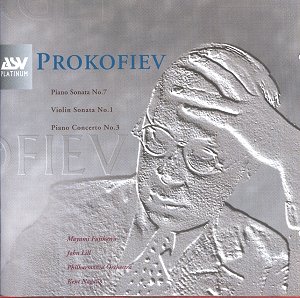Mari Kodama gives a highly musical account of Prokofiev’s
most popular concerto, originally issued in 1992 on CDDCA786, without
displacing any of the more usual favourites in this piece (Argerich
remaining at the top of the pile). Kodama is most successful in the
second and third movements. The finale, interestingly, is more balletic
than virtuosic, seeming like a segment from Romeo and Juliet
with piano obbligato. The problem lies in the first movement: glissandi
fail to glisten, there is an overall sense of Japanese over-politeness,
and the return of the introduction fails to convey a true sense of arrival.
The coupling here is interesting, though. The Seventh
Sonata has a peerless interpreter in Maurizio Pollini (DG), not to mention
Sviatoslav Richter. On a very superficial level, the music suits John
Lill’s heavy-handed style well (this performance is from CDDCA755).
Of course, the music poses no technical problems for Lill, but one cannot
get away from a certain pedestrian element, especially in the ‘Andante
caloroso’. The finale is exciting in its own way, but it does not have
the true cumulative energy this music requires.
The First Violin Sonata (originally on CDDCA667) receives
a mixed reading. The first movement is the most successful, giving the
impression of a substantive musical statement. Fujikawa’s stopping is
particularly commendable. The shrill recording is off-putting in the
Allegro brusco. Things do improve: the Andante is delicate, and the
finale dances quite nicely. There are some nice dialogues between Fujikawa
and her pianist, Craig Sheppard, but never are they really inside Prokofiev’s
skin.
A very interesting disc in terms of repertoire, then,
but alas none of the performances can be unhesitatingly recommended.
Colin Clarke
